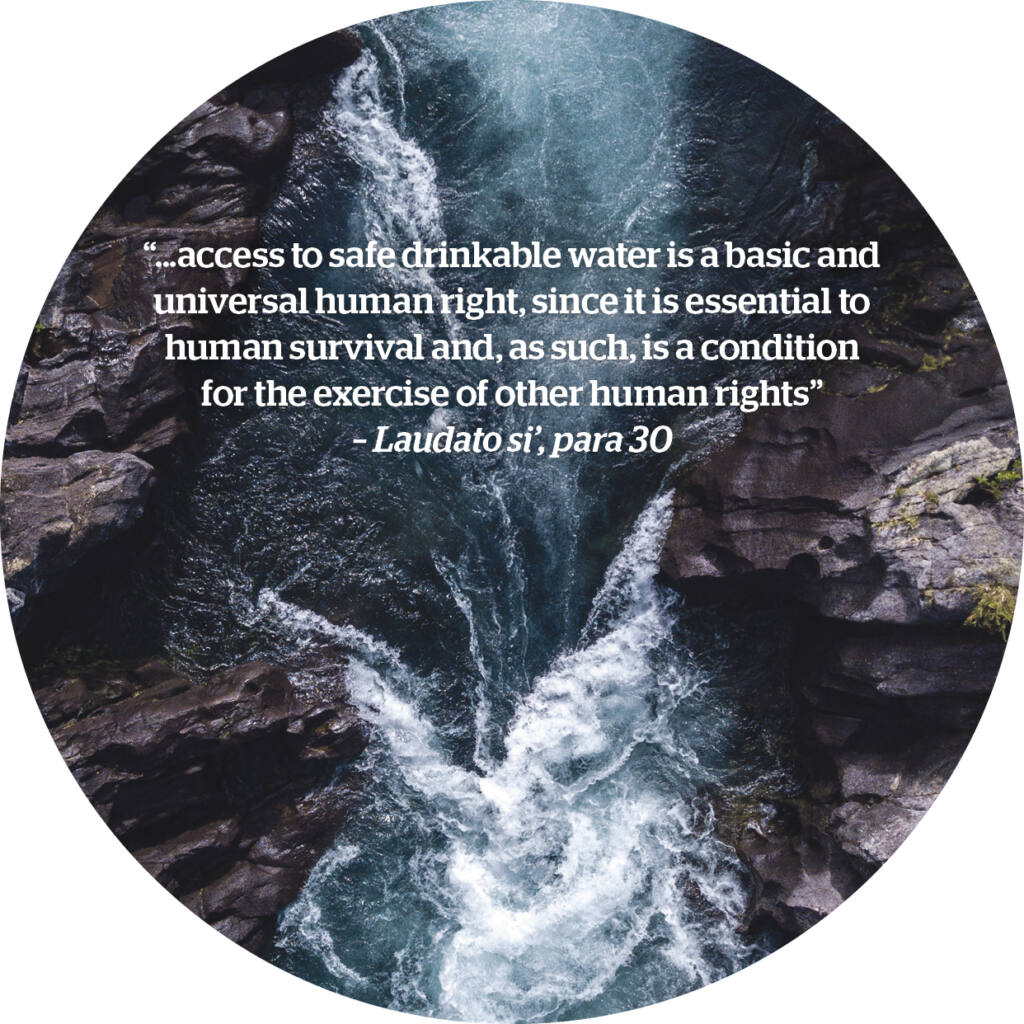WelCom March 2022
The government is proposing legislation to amalgamate the water services of 67 councils into four regional water entities. Jim McAloon, chair of the Wellington Archdiocesan Commission for Ecology, Justice and Peace, considers the controversial ‘Three Waters’ legislation in the light of Catholic social justice principles.

The government’s Three Waters proposals are intended to reform and reorganise the management of drinking water, stormwater, and wastewater (that is, sewerage). Currently these are the responsibility of city and district councils. In many areas the water infrastructure is inadequate or run down and there are problems with flooding; numbers of people become sick from unsafe drinking water, and sometimes sewerage overflows and pollutes. The stress on stormwater systems is likely to increase as severe weather events become more frequent. The anticipated cost of bringing the infrastructure up to date in the next decades is very large. The government’s proposal is to create four larger entities to control and manage – but not own – the water infrastructure. These entities would be collectively owned by the councils and their boards would consist of council representatives and representatives of mana whenua, in equal numbers.
The proposals have attracted much criticism. Some councils say that the proposals amount to seizure of their assets – or of ‘ratepayers’ assets’; some take the view that they have managed their water infrastructure responsibly and well and should be allowed to continue. There are concerns that the new entities will be remote and unresponsive to local concerns. Some critics object to involving mana whenua, claiming that this is of its nature undemocratic because Māori are a minority. On the other hand, some mayors say that there’s no way their councils could afford to do what needs to be done on their own resources, and so welcome the proposals.
What can the Church’s social teaching contribute to this debate? Pope Benedict XVI and Pope Francis have both observed in their encyclicals that ‘access to safe drinkable water is a basic and universal human right, since it is essential to human survival and, as such, is a condition for the exercise of other human rights’ (Laudato si’, para 30), and that ‘food and access to water as universal rights of all human beings, without distinction or discrimination’ (Caritas in Veritate, 27).
Water is not just another commodity.
Some more general principles in social teaching include:
- Participation;
- the Common Good;
- Distributive Justice;
- Preferential Option for the Poor and Vulnerable;
- Human Dignity; Stewardship; Solidarity;
- Subsidiarity; Promotion of Peace.
These are outlined on the Caritas Aotearoa New Zealand website (caritas.org.nz).

Subsidiarity is important; it ‘means ensuring decision making happens at the most appropriate level so all those affected can contribute’ and is about empowering communities. In any situation, ‘the most appropriate level’ is a matter for judgement, in this case involving questions of the cost of water infrastructure and how best to fund it, as well as meeting the needs of communities.
Together with subsidiarity, solidarity and distributive justice invite us to consider what structures might best ensure the right of all people in this country to clean water. Solidarity would also invite better-off communities to consider whether some loss of autonomy, in order to ensure that the less well off, can also meet their needs might be justified. Stewardship, also, reminds us that the gifts of creation belong to everyone, to future generations as well as the present. Put like this, therefore, a debate which emphasises the ‘rights’ of ‘ratepayers’ doesn’t cover the whole issue. Indeed, as Benedict noted, rights and duties balance each other (CV 43).
The Church’s social teaching has, also, become increasingly aware of the rights of indigenous peoples. Pope Francis writes, ‘it is essential to show special care for indigenous communities and their cultural traditions. They are not merely one minority among others, but should be the principal dialogue partners, especially when large projects affecting their land are proposed. For them, land is not a commodity but rather a gift from God and from their ancestors who rest there, a sacred space with which they need to interact if they are to maintain their identity and values. When they remain on their land, they themselves care for it best (LS 146)’.
As for land, so for water. In this country, churches were present at the signing of te Tiriti o Waitangi, and Catholic bishops recognised it in 1995 as ‘the covenant entered into by the Crown and Māori, on which this nation is founded.’ No matter how much some might desire it, Te Tiriti o Waitangi cannot be wished away; it guaranteed to iwi and hapū certain rights. As law and policy have evolved, these rights are sometimes expressed in terms of partnership.
There is plenty of room for discussion over how best to ensure the rights of all to clean water are guaranteed. The Church’s social teaching does not offer a simple instruction as to whether Three Waters should be supported or opposed, but it does offer some principles to aid reflection.
Jim McAloon is a professor of History at Te Herenga Waka Victoria University of Wellington School of History, Philosophy, Political Science and International Relations.